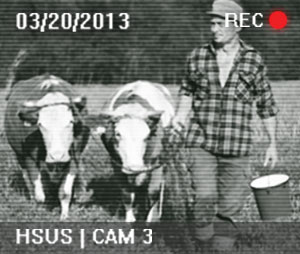Why is HSUS against Bills that Fight Animal Cruelty?
More and more states are considering proposals that would require reporting of animal cruelty that is videotaped or otherwise documented to law enforcement within 48 hours. The idea is to stop animal cruelty faster, yet the Humane Society of the United States and other vegan animal liberation groups are hysterical, running around and acting as if the sky is falling.
Let’s clear up some of the misinformation being thrown around.
- Myth: The bills will harm free speech There is nothing prohibiting activists from telling the media what they document. There is no “gag,” simply a duty to report findings to authorities. That’s similar to how it’s against the law in some areas to fail to report a crime.
- Myth: The bills are a desperate attempt to cover up bad acts. Gee, well, the bills require law enforcement to be notified of possible animal abuse, so that seems to be a rather poor cover-up scheme. And the videos could be used as evidence in open court. It’s not as if once a case goes to court that the media can’t cover all the details. Just look at the Jodi Arias trial.
- Myth: The proposals will harm whistleblowers. Whistleblowers are protected as long as they report any apparent crimes to authorities within 48 hours. This means activists can still film undercover, they just have a duty to report.
- Myth: The bills are written by the conservative think tank American Legislative Exchange Council (ALEC). One California paper’s editorial claimed a state bill copies ALEC model legislation. It doesn’t. That model legislation, first proposed in 2003 and called the “Animal and Ecological Terrorism Act,” is actually similar to a federal Animal Enterprise Terrorism Act that Congress passed in 2006. That’s an important piece of legislation in its own right to battle terroristic elements in the animal rights movement, but we’ll save that discussion for another day. (HSUS, by the way, also opposed this anti-terrorism law.)
Let’s repeat: Animal cruelty can still be covertly documented under these mandatory reporting proposals. The documentation just has to be reported to authorities. That’s hardly onerous or nefarious.
Remember, animal rights activists are not law enforcement and are not impartial. They have their own agendas, and the decision about how to proceed if they dofind animal abuse should not be up to them. It should be law enforcement’s call.
Why would this bother animal rights groups? Because it means they can’t just sit around with the cameras rolling for months while animals are abused so that they can, say, splice together footage andconcoct a (false) narrative, to say nothing of fundraising opportunities. Shouldn’t stopping animal cruelty be the one and only priority? You would hope so.
The primary issue here is stopping animal cruelty faster. Let’s not lose sight of that. And let’s hope the public doesn’t either despite the noise and propaganda from the Humane Society of the United States and its allies.




